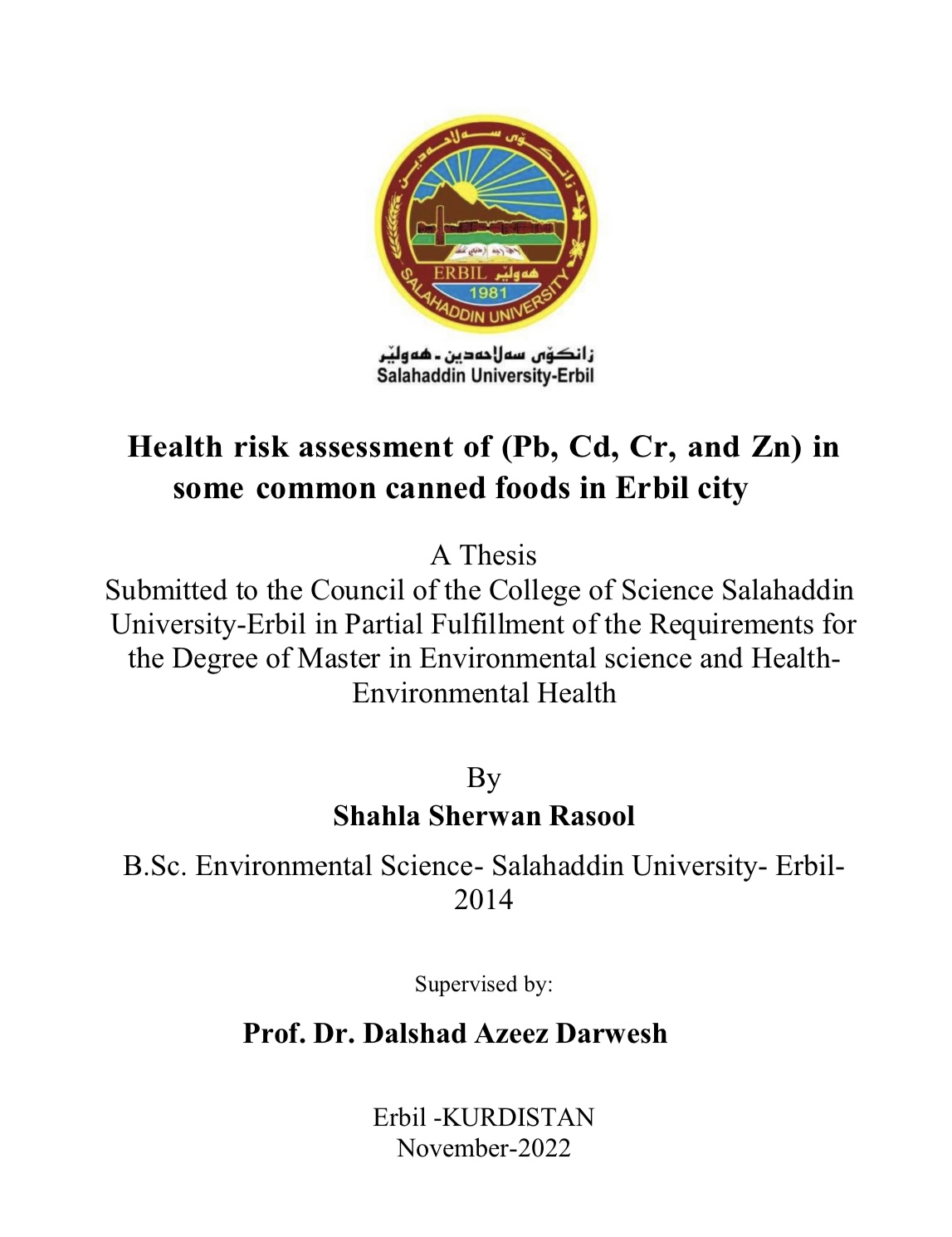
SUMMARY
An experiment was carried out in the College of Science, University of Salahaddin-Erbil for evaluation the health risk of some heavy metals including Pb, Cd, Cr, and Zn in some common canned foods including (canned tomato paste, canned fish, and canned cheese) purchased in Erbil markets. The experiments were implemented using a completely randomized design (CRD) with five replications. A total of sixty canned food samples of different brands and different manufacturing countries were selected randomly from five local supermarkets involving (Teammart, Shorsh, Show, Hawre & Lazya) in Erbil city, Kurdistan region, Iraq.
The canned food involved: 25 samples for canned tomato paste of five different brands including (Altunsa, Nawras, Rojin، Marjan, and Sharazwr), 20 samples for canned fish of 4 different brands such as (Altunsa, Shilana, Shabab & Tajaz) and 15 samples of canned cheese from 3 major brands (Smile, Al-marai & Kraft). The wet acid digestion procedure was applied for the digestion of selected canned food samples, and atomic absorption spectroscopy Perkins-Elmer USA 1100D was used for the determination of heavy metals in canned foods. The health risk indices (carcinogenic and non-carcinogenic) were used to evaluate the risk associated with metal content in canned food samples to human health.
The study results were summarized as follows:
- All the metals Pb, Cd, Cr, and Zn showed significant variation among canned food samples. Pb, Cd, and Cr mean contents exceeded the acceptable limit in 100% of all studied canned samples, Zn mean concentration exceeded the limit in 68% and 70% in canned tomato paste & canned fish respectively, whereas in canned cheese samples Zn exceeded the limit in all the samples (100%).
- In canned tomato paste there was no significant difference in Zn, Cd, and Cr content between brands while there was a significant difference in Pb content between brands 1,3, and 4. Also in canned fish, a significant difference was only found in Zn content between brands 2 and 4. In canned cheese, there was no significant difference in metal contents between brands
- The result of metal concentrations in all canned food samples were arranged in the following increasing order; Zn > Cr > Pb > Cd.
- The concentration of studied metals except for (Cd) in all selected canned food samples were arranged as follows in magnitude order canned cheese > canned fish > canned tomato paste. While for Cd was as follows canned cheese > canned tomato paste > canned fish.
- The result indicated that there was a positive correlation coefficient between Cr-Pb (r = 0.356) metals in canned tomato paste, between Pb-Zn (r = 0.585), Pb-Cr (r = 0.564), and Zn-Cr (r = 0.561) in canned fish and between Cr-Pb (r = 0.657), Zn-Cr (r = 0.514), and Zn-Pb (r = 0.597) with P-value < 0.05 in canned cheese.
- The results of non-carcinogenic risk for all studied metals in canned tomato paste demonstrated that HQ and HI were > 1, indicating that there was risk associated with the consumption of studied canned foods. While for canned fish & cheese HQ and HI < 1 indicated no risks to human health.
- The results of daily intake of metals in canned fish and cheese were lower than the tolerable daily intake of metals. The value of the PTWI is 0.025,0.007,1.05 and 5.6 mg.kg-1 Bw per week for Pb, Cd, Cr, and Zn respectively, which is equal to tolerable daily intake (TDI) 0.0035, 0.001, 0.15 and 1 mg.kg¯¹ Bw per day for Pb, Cd, Cr, Zn respectively. While in canned tomato paste daily intake of Cr and Zn was within (TDI) limit, while DIM of Pb and Cd (brand 2,3,4,5) exceeded (TDI) limit.
- Carcinogenic risk assessment findings showed that the metals in canned tomato paste and cheese were within the acceptable range (10¯⁶─10¯⁴), except for Cr which exceeded the limit range in all brands under the study, the highest cancer risk value in canned tomato paste was (91*10-2) which was recorded in brand 4 (Marjan) which corresponded to that among 10000 people about 591 people may suffer from cancer, and the lowest value was (4.80*10-2) indicated in brand 2 (Nawras) corresponded to that from the consumption of tomato paste (Nawras) about 480 people may suffer from cancer among 10000 people. Also, in canned cheese Pb and Cd cancer risks were within acceptable range while chromium exceeded the safe limit and the highest total cancer risk was found in brand 1 (Smile) (5.51*10-3) which may result in 55 cancer case in 10000 people and the lowest was in brand 2 (Al-marai) (4.72*10-3 ) which may cause 47 cancer case in 10000 people. While canned fish metals risk values were within the acceptable range.
